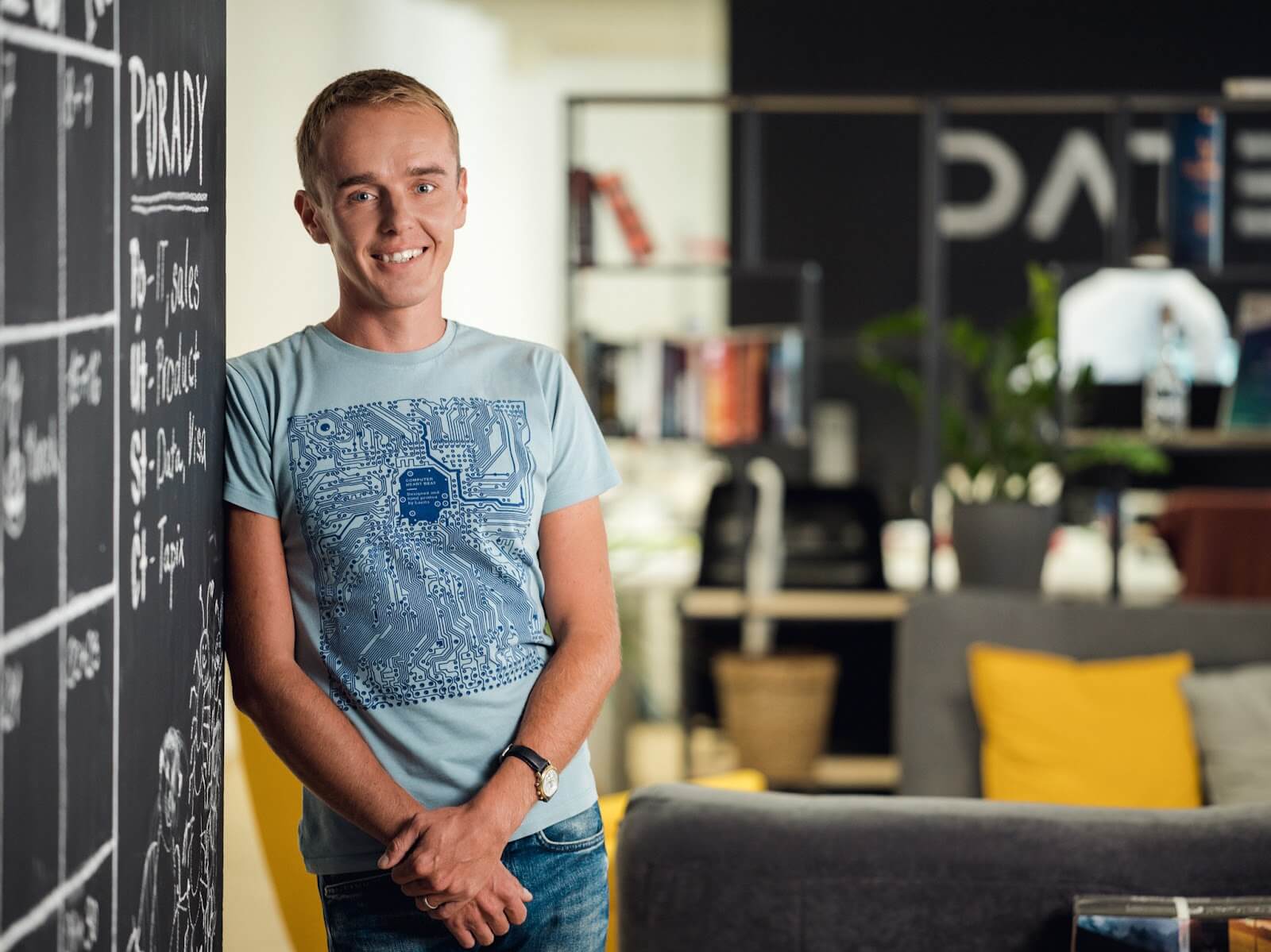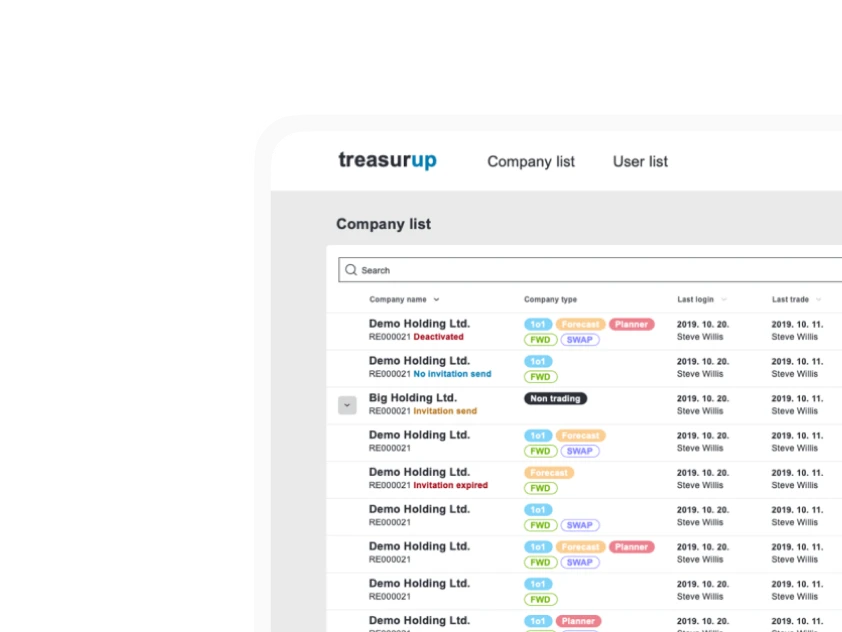The Czech Fintech Scene - innovation and ingenuity
When I meet Ivan Dovica online I’m in a warm home office. He on the other hand looks like an arctic explorer, wrapped up against a howling wind as he walks home at the end of the working day. Should I call back later at a more convenient time? But Ivan shrugs off the weather. Along with around six other colleagues he’s normally to be found on a bicycle for his commute across the hills of Prague. Apparently they’re quite a tough bunch at Dateio, the company Ivan co-founded back in 2013.

Dateio promises ‘Revenue Growth based on Payment Data. The new marketing tool that guarantees a high return on your investments. Try card‑linked marketing now.’ With more than 2.5 million clients receiving targeted offers straight to their mobile banking, the Dateio product is expressed in a simple four-step approach:
- Banks share anonymous payment data with us
- We see where and how much clients spend
- We select clients who will find the offer relevant
- You only pay for the customers who actually shop with you
OK, that makes sense.
‘Nothing… nothing… and then it happens’
As a mathematician and computer scientist by training, Ivan wasn’t necessarily expecting to become a Fintech entrepreneur, but when approached by colleague Ondřej Knot – who was working in innovation mapping in banking – the light started to glow for him. Together the two began planning the breakout that was to become Dateio: “The first year and a half… nothing,” he says. “Just two guys and a slide deck. We were insanely naive, but in this type of business it’s nothing… more nothing… and then it happens.” After those ‘nothings’, the uptake began with UniCredit in Czechia being the first bank to join the company, which offers to ‘Make card payment data useful’ with their marketing data enrichment.
For Dateio business grew rapidly and is now stable with around 30 employees, and clients including Raiffeisen Bank, the Erste Group, Bunq, Twisto, and Direct Finance. Dateio is also now onto the launch of its second product, TapiX. TapiX can further enrich data by adding GPS information, the payment category of a transaction, and the brand name and logo of a company providing the product or service.

Tom Bilske, Product owner at Netherlands Neobank Bunq reported, ‘People are looking for a clear idea of what they spent and where. It’s so much easier for people to understand their spending habits when they can visually see what’s happening. While looking for a solution to this, we found TapiX. They’ve helped us give people much better insight into their spending, and we’ve saved a tonne of time in the process. Using TapiX gave us a really high quality product, in a very short period of time.’
And here’s Mark Jindřich, Head of Product Innovation at Fidoo in the Czechia: ‘At Fidoo we had set the aim to better our UX and disclose more information to our clients about the card payments they make. During the process we discovered TapiX and their services. With the enriched data that comes with each payment, TapiX has helped us to upgrade the visual appeal of our service in a short amount of time and has opened new opportunities for our company.’
Easy but not hyper cool?
So it appears that there are plenty of interested clients, and that Fintech uptake in Czechia is easy. Ivan Dovica laughs at the description ‘easy’. “Actually the general environment for Fintech is quite easy and encouraging. But the size of the market is problematic. There are four main banks, and a population of around 10 million, so B2C activities are not so common. The focus is on B2B. There’s also a feeling that Fintech is not so hyper-cool.” So perhaps as yet the Czech population at large aren’t ‘getting’ Fintech? Ivan agrees, but points out that for a relatively small country, Czechia is strong in technology.
But Fintech not hyper-cool? He modestly points me in the direction of a fellow entrepreneur who he labels as a ‘superstar’, who may come closer to the idea of hyper-cool. So for the moment we’ll let Ivan continue on his wind-blown way home, and call in on the connection he provides to Michal Smida.
The Twisto approach
First question to the CEO and Founder of Twisto: So are you really a superstar? Not surprisingly, Michal shrugs this off, in part referring to the size of the Czech market. “We don’t feel like stars,” he laughs. “We are not Revolut. We always positioned ourselves as a regional player.” He goes on to say that his company, Twisto, is somewhat limited by capital, compared to Germany, France or Spain, where much greater funding can be found.
Nevertheless, Twisto has just completed a ‘decent’ round of funding which netted 20 million euro. With around 100 team members in Prague, 40 in Warsaw and 20 in Bratislava, Twisto is growing quite rapidly. And note the two secondary offices – already operating outside the home country. “Twisto is now quite old,” Michal explains. “We started with a simple proposition back in 2013, getting Twisto into Klarna Bank.” Online retail now accounts for about 10% of Twisto business, with 90% being generated from groceries, gas and fashion sales – all the day-to-day regular consumer stuff.

So what is the Twisto offering? – Well, according to the landing page, it’s ‘Live your way. Pay your way.’ Let’s check out how that works. It goes like this:
- Shop all month with Twisto
Once you register, you instantly get a monthly credit limit for your payments. You can shop online or in stores up to this limit. - There comes your invoice
On the first day of each month, you receive your monthly invoice. You have up to the 15th to settle it. - Defer the payment if you want to
You can leave the settlement till next month. Just pay 10 % of the invoice and defer the rest.
All clear? – That, in a nutshell, is Twisto. So where’s the company heading? “We started to evolve into a sort of Neobank where we want to process all of your payments,” Michal continues. “To do this we have built an ecosystem that is complex and comprehensive.”
So is Twisto a do-everything Fintech? “We began with a monoline and became – or are becoming – an all-in-one. But we are definitely not a cookie-cutter product. Banks have been around for hundreds of years. We’ve been around for less than ten years, so there’s some way to go!”

Operating with banks, rather than challenging them, has seen Twisto develop the offering with Raiffeisen Bank in Vienna, ING Bank in the Netherlands, and J&T Bank in Czechia. There’s also a joint venture with Uniqa Insurance Group in Poland, so Twisto seems to be decidedly outward looking. “What can be accomplished by Twisto in future is around five or six times where we are now,” says the CEO.
And the company name?
There surely had to be a story, and there is: In the early days of pulling together the company concept – all that brainstorming and typical startup long days and nights – Michal and a colleague popped out for some fast food refueling. They knew they wanted a company name that was easy to say and use across different markets, and that was catchy and memorable. At a nearby KFC, the hungry entrepreneurs noticed a sign for Chicken Twisters, and a company name was born!
While I’m delighted to hear this story, Michal seems to regard it as a ‘no biggie’. Like everything else he recounts about the development of Twisto, it’s all quite logical and essentially unexciting. This is step-by-step Fintech, meeting and serving widespread consumer-based needs. Twisto isn’t starting fires, but by building the ecosystem and alliances is actually radically altering the B2C market in Czechia and beyond.
Rules and more rules
Twisto started without any licensing issues, being partnered with a bank, but are regulators in Czechia friendly towards Fintechs? Michal says there is an evolution in licencing, and this evolving scene is very young. The relationship between Fintechs and lawmakers is not ‘Love-Hate’ and indeed, “Both sides have their own truth.” There have been some instances of Fintechs taken to court by the regulator, particularly over alleged crypto irregularities. Overall though the situation is not combative, perhaps in part due to the Czech Fintech Association, ‘connecting Financial services and cutting edge technologies.’ Which seems like a cue to call in on Maria Staszkiewicz, who’s been CEO of the Association since 2016.

The Czech Fintech scene is doing well, Maria reports. She’s speaking from the balcony of her apartment, hoping to avoid waking her baby with our call. I note that things have changed so much with the pandemic, where now we all admit our ‘real lives’ into the business sphere much more naturally.
The business side for Czech fintech companies has seen a decent increase in support from the regulators and less suspicion on the part of banks. “At first the majority of Czech banks did not seem to be interested in serious innovation,” Maria says. “But now most of them have woken up.” Another factor changing the perception of fintech companies is that the e-commerce sector has become very powerful, with the Czech market seeing the entry of Amazon, along with domestic e-commerce support solutions. So the market is changing from ‘not so vibrant’ to something far more positive. The regulatory part of the equation is also changing, mainly thanks to EU harmonization initiated by the philosophy of open banking contained in PSD2 , which Maria says is, “A rather revolutionary idea that still needs a lot of fine-tuning.”
Since 2020 Maria has also been President of the European Digital Finance Association – advocate for innovative, more affordable and secure financial services – so her overview is very much continent-wide, as well as being Czechia-specific.
The improving situation?
“In the Czech Republic the regulator is catching up, and the Ministry of Finance even has a unit dedicated to innovation now. The Czech National Bank used to have the motto, Don’t help, don’t protect,” Maria jokes, but the bank has now appointed a contact point for fintech companies. True, this consists of ‘just one and a half employees’, but it’s a positive step forward. “Banks always liked the physical contact, and lots of paperwork, but of course that is changing, and has had to change because of the pandemic. So the banks are changing, and the regulator is changing, but there’s still a way to go.” Maria cites examples of banks that have closed down accounts of fintech companies, for no better reason – apparently – than that they perceived them as competition. In some cases the Czech Fintech Association was able to discuss the situation with banks. “So we are always trying to mitigate situations on behalf of our 40-plus company members. Starting soon we’ll also be scheduling regular meetings with the regulator, so things are getting ever more open.”

And with the wider European scene? “The Financial Stability, Financial Services and Capital Markets Union Directorate General (DG FISMA) is pushing hard on open finance, eID and other regulations of financial services that could help the sector. On the other hand, some DGs are trying to horizontally regulate some technologies, and the results could be harsh. For example, for companies using AI it might become very business-unfriendly. In a way it’s hard to understand the Commission’s philosophy when taken as a single body. Of course it’s all in the name of consumer protection, but if it all goes through, we might have to say goodbye to many innovative companies – and not just in the fintech sector. For example a company entering the financial sector and planning on using AI or blockchain would have to employ lawyers from the very start of the process. That’s lengthy and costly, and new fintech companies would have a lot more paperwork and general documentation to deal with, as well as increased costs of course, at a time when they are probably not funded.”
So Maria observes, more leniency is needed in the way of compliance and diligence, especially for startups. “Go to the UK,” she observes, where there has been encouragement of innovation for some time, now even less constrained after the country’s departure from the European Union.
Maria began her career in Brussels, moving to the nonprofit sector, focusing on Public Administration and Foreign Relations. However she wanted to gain more influence on how economies were shaped, and figured that financial technology was the place to be, because innovation in financial services directly influences innovation in other sectors. It seems she’s arrived in the right place at the right time.
Expansion
But, you may be wondering, has Ivan Dovica made it home yet? Well actually no, but he’s very ready to continue walking and talking, with the story of the Fintech that he’s COO and Co-Founder of, Dateio. Remember, the ethos is of ‘Making card payment data useful with card linked marketing data enrichment.’
The idea started around 2013 and was ‘not so planned’. Ivan and his co-founder were working in the same bank, with Ondřej Knot mapping innovation in banking – something Ivan had seen in action in the USA.

From difficult beginnings, Dateio has grown to a current size of some 30 employees, having gained UniCredit Bank in Czechia as its first customer. And while Ivan sees the Fintech environment in the country as being ‘generally easy’, the size of the Czech market is problematic. “If starting locally, the market size takes the decisions for you. There are four main banks, plus of course the multinationals. So to some extent the potential is limited.”
One consequence for Dateio was to start successfully looking outside national borders, with a partnership with Bunq in the Netherlands being one example of expansion.
“We are maybe somewhere between Austria and the Netherlands,” Ivan thinks, in terms of market maturity. “We define ourselves as startups from the inside, and we’re very good at fixing things. It’s visible in technologies, where we are very strong. So we are a small country (10.6 million in 2019) with not many B2C big startups. There’s more B2B, and that means working with the banks. Here it’s all about references. Maybe in the UK, which is the number one Fintech country, innovation is more recognised. In Czechia, less so.”
Everyone is digital
Ivan points out that the pandemic has actually been a great leveller for Czech Fintechs. It’s no longer necessary to have in-person meetings with prospects in other countries – “Now we are all at the same starting line.” As well as no more time-wasting travel, conducting international business is now far more efficient and pleasant. “I’m optimistic,” Ivan says, “We can do business, and we’re developing the next steps to go more international. There are many Czech Fintechs, and most are proving successful. Fintechs are still here, and banking has changed to be more encouraging.” And as for legislation around PSD2, well, Ivan feels that the Czech regulator is probably not the hardest to work with.
“Cybersecurity is good here, and growing,” Ivan says, pointing to operations such as ThreatMark which enables banks to build completely trusted & safe online banking systems. (As a sidebar here, every year, the Czech government increases spending on cybersecurity, which amounted to around 1.944 million EUR in 2017 according to a report by Eurostat. In 2018, the Economist Intelligence Unit ranked Czechia among the 20 countries which spend the highest percentage of their GDP on technological innovation, including cyber-security services and e-government. The country also received the highest score among Eastern European countries for technological preparedness).

Ivan’s highlighting of Czech ability on the techy side of Fintech leads to the question of the place of UX-UI design in the country. Now “Everyone is digital, and that’s cool,” he says, but to some extent he sees Customer Experience as having reached a plateau. “Five years ago only some banks had mobile banking, but now all banks deliver a good high-quality service.” As for voice, as yet there’s little demand or uptake, although voice recognition services have been in use in Slovakia at Tatra Bank for a number of years. Generally however Ivan regards UX as an important part of any Fintech offering, “Of course it has to work!”
UX and UI
It’s an attitude shared by Maria Staszkiewicz, although she prefaces her comments by saying that she is ‘not a UX expert’. “There was a huge gap in the Czech market around user-friendly services. Doing anything with banks wasn’t a good experience.” She thinks for a moment about that and modifies her statement, “In fact, it was a disaster! Fintechs came along and filled the gap by providing real, working, user-experience. Now the banks have caught up with that. There aren’t any examples of revolutionary UX-design here – as far as I know – but systems are now well-established that are easy to use, especially in the consumer area. Examples include Monet+, specialists in secure identity and payment solutions; Resistant.AI, based in Prague and Brussels; and of course, Twisto.
So what role does UX-UI play for Twisto? – The question seems to strike Michal Smida as if I’m asking him whether it’s a good idea to have wheels on a car. “It’s important, but not decisive,” he says. “The whole UX thing is overrated and really it’s about better onboarding. If a customer needs the money, they go for it, whether or not the UX is great or not. I know I’m undermining our own proposition, but really the consumer doesn’t care that much. In the recent past, banks did a truly terrible job of their UX, but now banking apps have really developed.” He cites George from Erste Bank as a really good app.
George, according to Erste Bank, ‘Can do more than regular internet banking. He will catch your eye with his attractive modern graphics, user-friendly interface and above all, original functions allowing you to conveniently manage your finances.’
(And for any trivia fans, were you aware that the George app was named after the first ever aviation autopilot invented by pioneer Lawrence Sperry in the 1900s?)
But back to Czechia and right now: KBC’s Kate chat and voice solutions assistant is used by Obchodni Banka, but Michal hasn’t had direct experience of it and feels that Twisto has some way to go before needing such technologies. At the same time, he does point out that Twisto already has a voice assistant specifically to help customers who are blind.
Despite Michal’s somewhat agnostic approach to UX design, he is however quoted as a satisfied client on the TapiX by Dateio website: ‘Mobile phones are full of colour, but transaction details in banking apps look like an accounting program from the 90s. When we were searching for a solution on how to give meaning to transaction data, we found TapiX. We like that customers now have much easier navigation and visual cues when searching or navigating through transactions. The reason why we decided to outsource this capability was to save our time and deliver the best solution in the market.”
And as for gamification, Michal describes it as ‘an overrated gimmick’ which he has ‘never seen working’. So what actually does work then? – “Good features and a high level of execution. And branding can be really important too. Revolut is a prime example with its metal cards being a real status symbol in some countries – for instance Romania.”
Wrapping up
As we’re still with Michal, let’s wrap up with the personal side: He attended highschool in the USA and then Russia, and earned his BSc in Business Management from Kings College, London. So a very well travelled and rounded individual. He’s also a founding board member of the Czech Fintech Association, by the way. As to hobbies, interests or passions, he’ll only be drawn on these being, ‘Work and family.’
A similar story with Ivan Dovica I suspect, with three children and a rapidly growing enterprise to support, plus a compelling mountain-biking habit.
And for Maria Staszkiewicz the meeting of Creativity and Digital occupies her non Fintech Association time. As an artist she is interested in how the blockchain influences art, and vice-versa, and is active in the area.
I say my goodbyes, having talked with three committed proponents of the Fintech scene in Czechia, feeling that in a few short years the situation has developed a long way from Maria’s description of initially ‘not so vibrant’, to a much more positive one. In a country which only came into being in its present form in 1993, huge strides have been made in creating a successful market economy, with healthy trade and industry. And from what I have learned during an all too brief visit, Czech Fintech people seem outward looking, and very ready to embrace challenges, meeting these with innovative solutions, and ingenuity.









